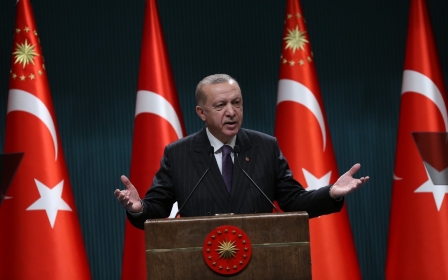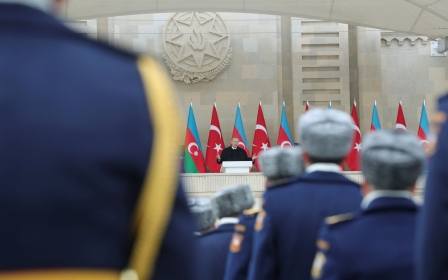Russia and Turkey to continue military cooperation despite US sanctions

Russian Foreign Minister Sergei Lavrov said military cooperation with Turkey would not be deterred by US sanctions imposed on Ankara over its acquisition of a Russian missile defence system.
"Relations between Russia and Turkey are self-sustainable and self-sufficient; they don’t depend on someone’s aggressive and hostile actions and whims," Lavrov said on Tuesday.
"They [their relations] are based on the national interests of each of our countries and on our determination to continue mutual cooperation and mutual benefit by searching for a balance of interests."
Turkish Foreign Minister Mevlut Cavusoglu, who is visiting Moscow, said US sanctions were an act of aggression and violated Ankara's sovereign rights.
"We prefer to solve all issues, including that of the S-400, through negotiations," Cavusoglu said.
New MEE newsletter: Jerusalem Dispatch
Sign up to get the latest insights and analysis on Israel-Palestine, alongside Turkey Unpacked and other MEE newsletters
"After introducing the sanctions, the US announced it favours dialogue. We've never been against dialogue."
Earlier this month, the US imposed sanctions on Turkey for buying Russia's S-400 air defence system, with officials in Washington saying Ankara’s purchase of the missile system constituted a threat to the security alliance.
US Secretary of State Mike Pompeo at the time assured Cavusoglu that the US sanctions were intended to prevent Russia from receiving substantial revenues from the sale, which is estimated to be valued at $2.5bn.
Ankara has said it only purchased the Russian system after unsuccessful negotiations over a US-made system, while Washington has said it has repeatedly offered its Turkish counterparts an American missile defence system if it scraps the S-400 deal.
After the sanctions announcement, Turkey said it would not turn back on the S-400 system, and added that the US sanctions would not impact the country's defence industry.
In recent years, Turkish President Recep Tayyip Erdogan and Russia's Vladimir Putin have sought to maintain good relations, but the two sides have been embroiled in several conflicts where they are on opposing sides, including Syria and Libya.
The two sides were also at odds in the six-week war between Armenia and Azerbaijan over the disputed Nagorno-Karabakh region, where Moscow and Ankara are currently jointly monitoring a Russian-mediated ceasefire.
Middle East Eye delivers independent and unrivalled coverage and analysis of the Middle East, North Africa and beyond. To learn more about republishing this content and the associated fees, please fill out this form. More about MEE can be found here.





